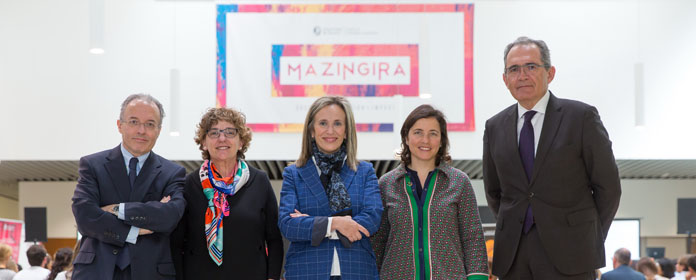Reducing fossil energy consumption, strengthening the wind energy sector and promote the Economics circular, the challenges for sustainability in Navarra.
National and international experts participate in a workshop on sustainability at business organized by the University.

"Decreasing the consumption of fossil energies, strengthening the wind energy sector and promote the circular Economics are the three great challenges for sustainability in Navarra". This was explained today by the Director General of Economic and Business Policy and work of the Government of Navarra, Izaskun Goñi, during her speech at I workshop of Sustainability in the business organized by the School of Economics of the University of Navarra.
He also stated that the region already stands out for having a specific industry Economics circular. "In Navarre everything is recycled, from tires to plastics to eggshells, and all of this with very high billings," he assured.
On the industrial level, he indicated that "more proactive public policies are needed, such as those that already exist in Navarra, to encourage investment in renewable energies and the purchase of electric vehicles for individuals and companies". On the other hand, he pointed out that the next challenge to be more sustainable lies in the creation of a strategic plan for attracting and retaining talent. "We are good at retaining, but we are very bad at attracting talent," he said.
committee For her part, María Mendiluce, general manager of the Climate, Energy and Circular Economics section of the World Business Council for Sustainable development (WBCSD), stressed that "for development to be sustainable it must first be profitable". Along these lines, she said that "it makes no sense for the industrial sector not to be included in sustainability plans". Likewise, the WBCS expert urged entrepreneurs to be more sustainable. "Unfortunately, many companies only start working on sustainability issues when there is a regulation or when public opinion forces them to," she insisted.
In this regard, Alberto Andreu, senior advisor at EY and professor at the University of Navarra, stated that "it is not enough just to comply with the law". In his opinion, the great challenge that organizations have is responsibility in decision-making. "Measures are being taken based on profitability, but sometimes the red lines are not clear. We have been very lax in how decisions are made, always thinking about profits and not the moral implications. Companies have to be consistent with what they say and what they do," he said.
Similarly, the general director of Timac Agro Spain, Ricardo Llátser, said it is necessary to invest in research to create products that are more effective and sustainable and gave as an example the work that is being done from Chair Timac Agro - University of Navarra in which they study how to achieve with organic products "the same results as with products not so friendly to the environment".
Students committed to the environmentThe workshop, which was attended by more than a hundred entrepreneurs, academics and students, was part of the "Social Innovation Summit. Mazingira", an activity organized by the students of the Leadership and Governance program at Degree of Economics of the University of Navarra. Mazingira is an event that seeks to bring together companies and experts to interact and share visions about the new challenges in subject sustainability. The name, which means 'ecosystem' in Swahili, responds to the students' desire to create an ecosystem in which different social actors can propose ideas to create a more sustainable world.
In this first edition, students from different Schools had the opportunity to solve a challenge posed by business Navarra MRA: the creation of a sustainable city that works with Economics circular. The students tackled different parts of the problem to create a joint solution.
